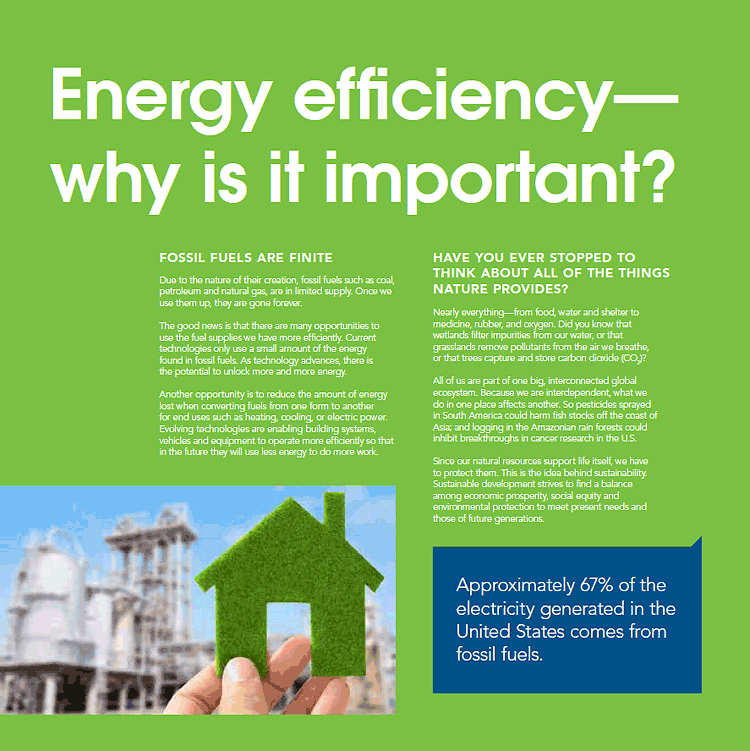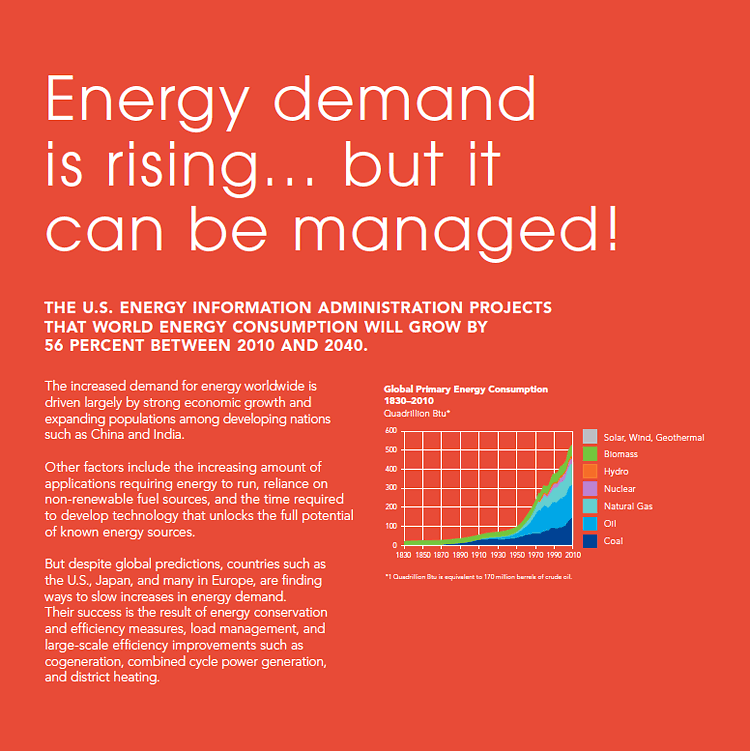-

Energy efficiency - why is it important?
Approximately 67% of the electricity generated in the United States comes from fossil fuels.
Fossil fuels are finite
Due to the nature of their creation, fossil fuels such as coal, petroleum and natural gas, are in limited supply. Once we use them up, they are gone forever.
The good news is that there are many opportunities to use the fuel supplies we have more efficiently. Current technologies only use a small amount of the energy found in fossil fuels. As technology advances, there is the potential to unlock more and more energy.
Another opportunity is to reduce the amount of energy lost when converting fuels from one form to another for end uses such as heating, cooling, or electric power. Evolving technologies are enabling building systems, vehicles and equipment to operate more efficiently so that in the future they will use less energy to do more work.
Have you ever stopped to think about all of the things nature provides?
Nearly everything - from food, water and shelter to medicine, rubber, and oxygen. Did you know that wetlands filter impurities from our water, or that grasslands remove pollutants from the air we breathe, or that trees sequester carbon dioxide (CO2)?
All of us are part of one big, interconnected global ecosystem. Because we are interdependent, what we do in one place affects another. So pesticides sprayed in South America could harm fish stocks off the coast of Asia; and logging in the Amazonian rain forests could inhibit breakthroughs in cancer research in the U.S.
Since our natural resources support life itself, we have to protect them. This is the idea behind sustainability. Sustainable development strives to find a balance among economic prosperity, social equity and environmental protection to meet present needs and those of future generations.
-

Is the climate really changing?
According to the United Nations Intergovernmental Panel on Climate Change (IPCC), "it is unequivocal that the climate is warming."
The Northeast region of the U.S. has been warming at a rate of nearly 0.5 degrees F per decade, with winter temperatures rising faster at a rate of 1.3 degrees F per decade, since 1970. This warming correlates with:
- More frequent days with temperatures above 90° F;
- Reduced snowpack and increased snow density;
- Earlier breakup of winter ice on lakes and rivers;
- Earlier spring snow melt resulting in earlier peak river flows; and,
- Rising sea-surface temperatures and sea levels.
Since the Industrial Revolution, human activities have contributed substantially to climate change by adding CO2 and other heat-trapping gases to the atmosphere. These gases have increased the greenhouse effect, causing the Earth's surface temperature to rise. The main human activity affecting the amount and rate of climate change is emissions from the burning of fossil fuels.
Gases that trap heat in the atmosphere are called greenhouse gases.
To ensure the future viability of the built and natural environments and the health and safety of the public, adaptation planning is prudent and necessary. These efforts support the need for more energy efficient buildings, water conservation and biodiversity/ecosystem protection.
-

Energy demand is rising... but it can be managed!
The U.S. Energy Information Administration projects that world energy consumption will grow by 56 percent between 2010 and 2040.
The increased demand for energy worldwide is driven largely by strong economic growth and expanding populations among developing nations such as China and India.
Other factors include the proliferation of new applications requiring energy to run, reliance on traditional fuel sources, and the slow pace of technological advances unlocking the full potential of known sources.
But despite global predictions, countries such as the U.S., Japan and throughout Europe are finding ways to level off increases in energy demand. Their success is the result of energy conservation and efficiency measures, load management, and large-scale efficiency improvements such as cogeneration, combined cycle power generation, and district heating.
-

Discover Your Ecological Footprint
How much "nature" does it take to support your lifestyle?
The ecological footprint calculator is a useful tool that determines the impact of a person on the environment, expressed as the amount of land required to sustain their use of natural resources. It takes into account all of the biological materials consumed, and all of the biological wastes generated, by a person in a given year.
-

Lets Make a Change
Doing more with less energy benefits you, your community, and the world.
Energy efficiency...
- Enhances health and well-being
- Boosts the local economy
- Reduces public infrastructure costs
- Conserves natural resources
- Saves you money on household bills
- Strengthens national security






